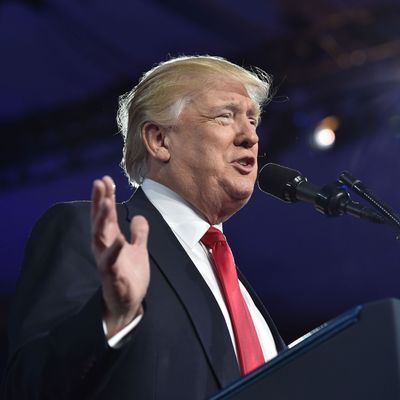
On Friday, president Trump said that the media “shouldn’t be allowed” to cite anonymous sources — because America’s most respected newspapers routinely “make up” such sources, and publish stories of their own invention. He reiterated his contention that “fake news” outlets like the New York Times, NBC News, ABC News, CBS, and CNN are “the enemy of the people,” and suggested that Americans should not protest their government in between elections.
The president also said, “I love the First Amendment — nobody loves it more than me.”
Trump and his administration have been waging a war on objective reality — and those tasked with describing it — from the moment he was sworn in. In his first appearance as White House press secretary, Sean Spicer demanded that reporters believe the president’s estimate of the size of his inaugural crowd over their own lying eyes. As Trump’s tumultuous (and not terribly productive) first month in office progressed, he grew ever more preoccupied with discrediting the Fourth Estate.
On Thursday, at the Conservative Political Action Conference, Steve Bannon and Reince Preibus instructed the audience not to believe any negative news they read about the administration, over and over again. By the end of their conversation, the word media had been spoken 19 times, and the phrase opposition party, Bannon’s favorite synonym for the mainstream press, six times.
It wasn’t terribly surprising, then, that the president opened his remarks to CPAC with a long diatribe against the media. But Trump’s speech did represent a significant escalation in his crusade against independent journalism.
Previously, the president had criticized the press for printing “illegal leaks” from anonymous government officials and suggested that those officials have often shared false information. But he’d never before claimed that major newspapers were fabricating sources out of whole cloth and presenting works of fictions as reportage.
“The leaks are real. You’re the one that wrote about them and reported them, I mean, the leaks are real,” Trump told reporters at a press conference last Thursday. “You know what they said, you saw it and the leaks are absolutely real.”
As of Friday morning, the president still maintained that the anonymous officials quoted in the media were genuine members of the government.
But hours later Trump suggested that reporters can’t find actual government officials to leak to them, and thus are forced to invent them.
“A few days ago I called the fake news the enemy of the people. And they are. They are the enemy of the people,” Trump said. “Because they have no sources, they just make ’em up when there are none … I’m against the people that make up stories and make up sources.”
The people that “make up stories” ostensibly includes all of the major outlets listed in this recent tweet.
Late Thursday night, the Trump administration admitted that it had encouraged the FBI to anonymously leak exculpating information about the president’s relationship with Russia. On Friday morning, Trump declared, “They shouldn’t be allowed to use sources unless they use somebody’s name … They should put the name of the person. You will see stories dry up like you’ve never seen before.”
Then, after briefly praising the First Amendment, the president said that media “doesn’t represent the people,” and “we’re going to do something about it.”
Trump’s only substantive argument for why his audience shouldn’t trust the media was that most of these outlets’ pre-election polling suggested that he would not win. He then credited the Los Angeles Times’ poll for its singular accuracy. That poll predicted that Trump would win the popular vote, making it one of the least accurate national polls of the 2016 cycle.
But in the president’s telling, fake news outlets and skewed pollsters aren’t the only ones who have been abusing their First Amendment rights — the other enemies of the American people are … the American people who didn’t vote for Donald Trump.
Referring to the town hall protests in support of Obamacare, Trump said, “The people that you’re watching, they’re not you. They’re largely – many of them are the side that lost, you know they lost the election. It’s like, how many elections do we have to have?”
The election is over. The world’s biggest fan of the First Amendment won. So, if you voted against him, it’s time to shut up.






























